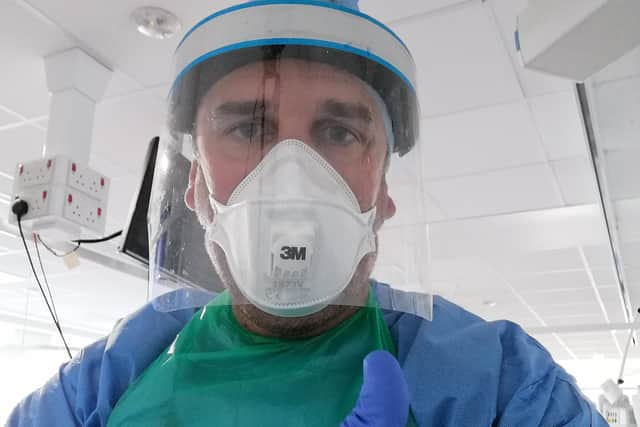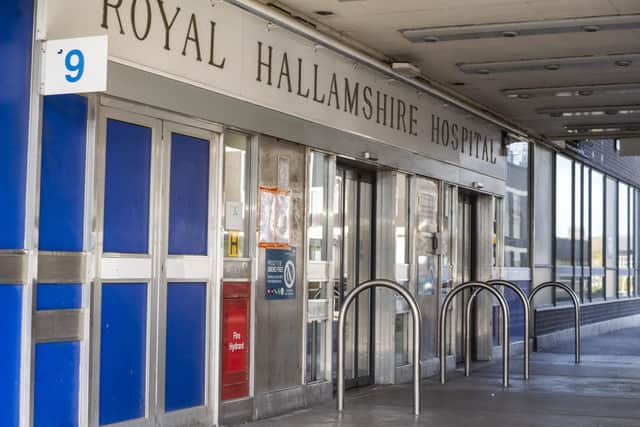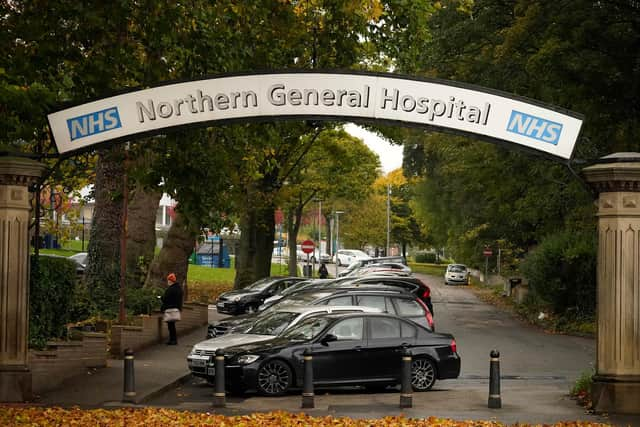‘Breaking point’: Union reports Sheffield hospitals face second wave staffing crisis
and live on Freeview channel 276
Unison representative and nurse Joan Pons Laplana slammed the way the Government has failed to resolve the ‘longstanding’ issue of understaffing over recent years and said that the pandemic has made “an already bad situation worse”.
Mr Laplana has warned that medical professionals fear that the increasing number of patients in Sheffield Teaching Hospitals, combined with the growing number of staff off sick, will mean that the necessary level of care cannot be provided to both Covid and non-Covid patients during the winter period.
Advertisement
Hide AdAdvertisement
Hide AdHe quoted figures shared with Unison from an NHS HR briefing, which at the time of writing (November 11) said that 1722 staff are currently off sick from Sheffield Teaching Hospitals.


952 of these are listed as ‘Covid-related’; 770 are other sicknesses. This represents 9.97 per cent of the work force.
Meanwhile there are 312 Covid-19 patients in Northern General and Royal Hallamshire Hospitals – a figure that has been rising consistently since September. The first wave peak in April was 300.
Mr Laplana said: “My concern is how hospitals are going to get through winter when they have a massive shortage in the amount of staff. The NHS has been short of staff and getting worse for the past three years and the Government has not done anything.
Advertisement
Hide AdAdvertisement
Hide Ad"The statistic for ‘Covid-related’ does not necessarily mean they have tested positive. It could be they are isolating because of contact with somebody who tested positive, or could be because their children tested positive.


“There is also a significant proportion of staff listed as off for ‘non-Covid’ related reasons who are off because of stress. This is actually Covid-related, as it is because of the pressure staff are being put under during the pandemic."
Mr Laplana said that as staff face a “mental health crisis” caused by the pressure of working during the pandemic, the shortage will only get worse.
"The impact on the mental health of staff is huge,” he said. “Staff are meant to get a rest period over summer but were not able to get that because the hospitals were constantly working at maximum speed.
Advertisement
Hide AdAdvertisement
Hide Ad“The weekend before last, on Friday, Saturday and Sunday, (October 30 – November 1), there were a thousand shifts that needed filling. There were not enough staff to fill it.


"We have support from the NHS Professionals (temporary staff bank) but they are not able to cover properly as they cannot provide the same level of care. Some can’t give drugs, and some can only do certain procedures. That puts extra pressure on the staff that are on duty with more training.
"In my professional experience, I know that you come home from work and you bottle everything up. You don’t want to tell your loved ones about patients that died and that you feel awful. They are already worried about you risking your life going in with Covid patients.
"It is like going into work on a battlefield every day. You just don’t know what is going to happen. It is stressful trying to deal with how things change constantly. It is having a serious effect on the mental health of staff.
Advertisement
Hide AdAdvertisement
Hide Ad"Even if we carry on with the same number of patients and it doesn’t rise staff are going to get tired. They will be worn down by the constant demand on the wards and more will be off sick. Winter is very stressful for staff anyway.”
Mr Laplana warned that the necessity to go ahead appointments and scheduled operations for non-Covid patients during the second wave – procedures that were often postponed during the first time – was adding to the pressure on the NHS.
“At the moment Sheffield hospitals are managing and if you look at the stats for ICU in the first wave we had one of the best mortality rates in the country. “This is because we managed to keep the ratio or nurse to patient at 1:1. We were able to do this because all other operations were cancelled and staff were redeployed.
"But this time in the second wave we are not able to stop other operations as cancelling those puts people with things like cancer at risk. The impact the cancellations in the first wave had on non-Covid patients has been huge.
"It is a difficult balance.”
Advertisement
Hide AdAdvertisement
Hide AdHe explained that the shortage of staff would mean that the ratio of nurses in hospitals across the country would in fact be closer to 2:1 during the second wave – a figure he says the Government has approved.
He said: "We cannot move the ratio from 1:1 to 2:1. It is 1:1 for a reason. That is what we need to save lives. When you change that you are putting lives at risk.
"The mortality rate will increase as there will not be enough nurses.
"Three years ago the Red Cross said the UK was in an emergency in terms of staff numbers and since then the Government has done nothing. With the added pressure of Covid we are at a critical point; it is being stretched too far.
Advertisement
Hide AdAdvertisement
Hide Ad"Staff are doing their best but they are not superheroes. There is only so much they can do. An already bad situation has been made obvious and worse because of Covid.”
Professor Chris Morley, Chief Nurse, Sheffield Teaching Hospitals NHS Foundation Trust said: “We are very busy but we had plans in place for a second wave of COVID-19 patients and thanks to the exceptional efforts of our clinical and non-clinical staff we have been able to provide the care needed.
"The number of patients needing intensive care in this second wave is considerably less than last time and so we have no issues with ITU capacity.
“For example we have 20 patients at present compared to a high of almost 40 previously. We have been very fortunate that we have had very low levels of staff absence during the pandemic, due in part to our staff testing service.
Advertisement
Hide AdAdvertisement
Hide Ad"We have 18,500 staff and our absence level due to COVID related reasons is just over 5% currently due partly to staff needing to leave to care for children who are self-isolating and not in school or as a consequence of the higher prevalence of the virus in the community.
"The 5% is clinical and non-clinical staff. We have robust monitoring in place to ensure that we can respond quickly to staff absence to ensure limited impact on patient care and for nursing this is in place 24 hours a day to ensure we have appropriate staff in place.
"We would not let a ward operate with unsafe levels of staff even during these very busy times. I would like to pay tribute to all our staff who are working so hard to meet the demands of this current rise in demand and we have put in place a range of support to help them look after their own health and wellbeing.
"This includes over 50 Calm rooms with refreshments provided so they have a quiet place to go to relax and reflect.
Advertisement
Hide AdAdvertisement
Hide Ad"A 24-hour mental health support service and lots of other practical advice and support. We have also continued to recruit staff and during the last few months just over 100 new nurses have joined us.
“We never take for granted how fortunate we are to have such fantastic staff and so with the support of Sheffield Hospitals Charity we are looking all the time at what else we can do to support teams during the pandemic but also long term.”
Mr Laplana said that Sheffield Teaching Hospitals management was putting in place a number of measures to try and help its staff cope with the mental strain of work during the pandemic.
This includes ‘calm rooms’, where staff can take a break. These will contain signposts telling staff where they can get help if they need it.
Advertisement
Hide AdAdvertisement
Hide AdCounselling sessions and appointments are also being provided.
"The hospitals are doing their best,” Mr Laplana added. “The managers are trying to improve the mental health of staff and put things in place to help them cope but it is a systematic problem, not with individual hospitals but in the NHS.
"The understaffing is a problem the Government has known about for a long time and it has done nothing. Now it is impossible for us to carry on as if it is business as usual. We are at breaking point.”